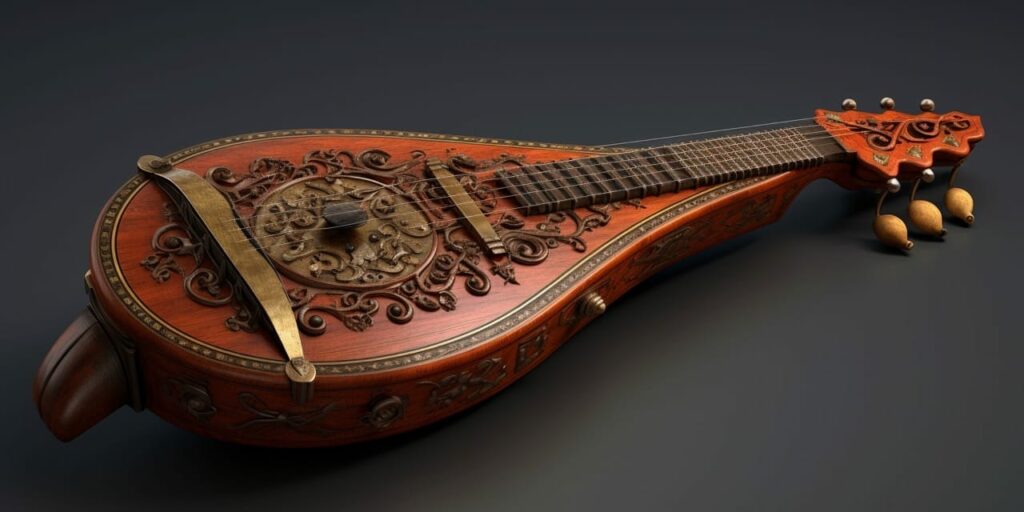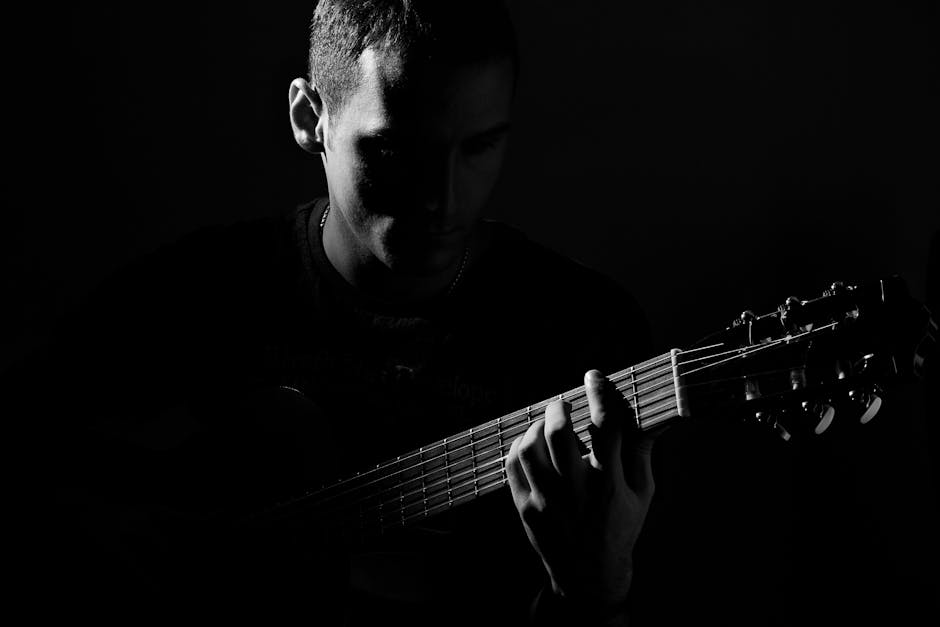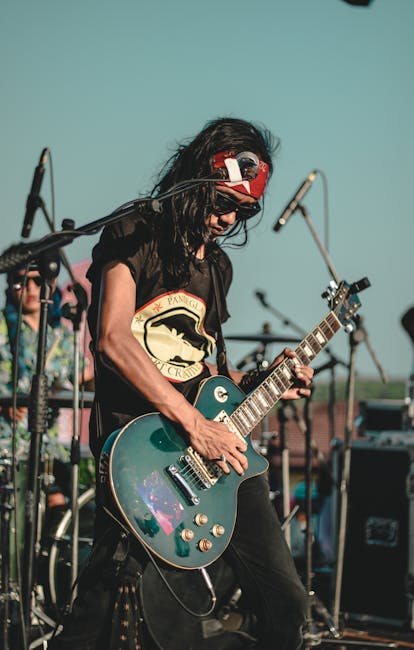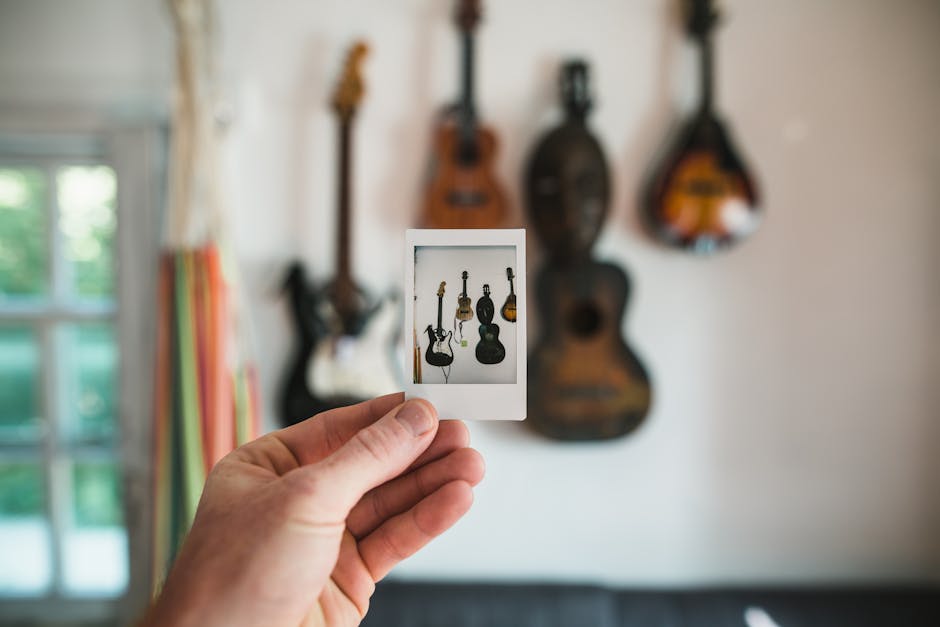In the grand symphony of music history, the guitar has been the ultimate rockstar, strumming its way into the hearts and souls of listeners across the globe. With more power chords than a superhero and more riffs than a bag of Doritos, the guitar has wielded its influence like a six-stringed sorcerer, shaping the very fabric of musical evolution. From the swinging 60s to the headbanging 80s and beyond, the guitar has been there to soundtrack our lives, proving that when it comes to making history, six strings are better than one. So tune in, turn up, and prepare to rock out as we delve into the epic saga of “The Guitar‘s Influence on Music History“.
Contents
- 1 The Evolution of the Guitar in Western Music
- 2 The Role of the Guitar in Jazz and Blues
- 3 Acoustic Innovations: The Guitar in Folk and Country Music
- 4 Electric Revolution: How the Guitar Shaped Rock and Roll
- 5 From Flamenco to Classical: The Guitar’s Versatile Appeal
- 6 The Guitar’s Impact on Pop Music and Beyond
- 7 Technology and the Guitar: Effects, Pedals, and the Future of Music
- 8 FAQs
- 9 Rock On!
The Evolution of the Guitar in Western Music
From the simple strumming of the ancient Greeks to the shredding of Eddie Van Halen, the guitar has undergone quite the transformation in Western music. Let’s take a look at how this versatile instrument has evolved over the centuries:
First up, we have the ancient Greeks who played a stringed instrument known as the kithara. This early version of the guitar was often used in religious ceremonies and had a sound that would make even the most hardcore metalhead weep tears of joy.
Fast forward to the Renaissance period where the guitar made its way into the hands of nobles and musicians alike. With its new lute-like shape and intricate designs, the guitar became a symbol of wealth and sophistication.
Then came the 19th century where the guitar underwent yet another transformation with the invention of the modern acoustic guitar. With its steel strings and bold sound, this new iteration of the guitar paved the way for the rockstars of the future.

The Role of the Guitar in Jazz and Blues
When it comes to jazz and blues music, the guitar plays a crucial role in setting the mood and adding that extra flavor to the tunes. This versatile instrument has been a staple in these genres for decades, and for good reason!
With its soulful tones and expressive capabilities, the guitar has the power to convey a wide range of emotions – from joy to sorrow, from excitement to longing. Whether it’s a jazzy riff or a bluesy lick, the guitar knows how to speak to the heart of the listener.
From the smooth, laid-back sounds of jazz to the raw, gritty vibes of blues, the guitar is a chameleon that can adapt to any musical setting. It can be sweet and gentle one moment, then fierce and aggressive the next – all while keeping its cool factor intact.
So next time you find yourself tapping your foot to a jazzy tune or nodding your head to a bluesy riff, take a moment to appreciate the intricate role that the guitar plays in shaping the sound and feel of the music. It’s truly a magical instrument that adds that extra special touch to any jazz or blues performance.
Acoustic Innovations: The Guitar in Folk and Country Music
When it comes to folk and country music, the guitar is like a trusty sidekick – always there to strum along and keep the rhythm steady. But did you know that over the years, musicians have come up with some pretty innovative ways to use this classic instrument? From unique playing styles to custom modifications, the world of acoustic guitar in folk and country music is full of surprises.
One of the most iconic innovations in acoustic guitar playing is the use of fingerpicking. Instead of just strumming away at the strings, some musicians use their fingers to pluck out individual notes and create intricate melodies. This technique gives folk and country songs that distinctive, twangy sound that we all know and love. It’s like the guitar is having a fancy finger dance party, and each note is an invitation to join in!
Another cool innovation in the world of acoustic guitar is the use of alternative tunings. Instead of sticking to the standard tuning of EADGBE, some musicians like to mix things up and create their own unique sound. By tweaking the tuning of the strings, they can achieve new and interesting chord combinations that add depth and richness to their music. It’s like a secret code that only guitarists can decipher – a hidden world of sonic possibilities waiting to be unlocked.
Lastly, let’s not forget about the creative modifications that some musicians make to their guitars. From adding extra strings for a fuller sound to installing pickups for a louder output, the possibilities are endless. Some even go as far as decorating their guitars with intricate designs or custom paint jobs, turning their trusty instrument into a work of art. It’s like giving your guitar a makeover and turning it into a superstar – because let’s face it, every guitar deserves its moment in the spotlight!
 Rock and Roll”>
Rock and Roll”>
Electric Revolution: How the Guitar Shaped Rock and Roll
Picture this: the year is 1954 and a young musician by the name of Chuck Berry picks up his newly electrified guitar and strums the first chords of what would become the iconic song “Johnny B. Goode.” Little did he know, this moment would mark the beginning of an electric revolution that would forever shape the landscape of rock and roll music.
With the invention of the electric guitar, musicians suddenly had a new tool at their disposal to create sounds never before heard. The ability to manipulate tone and volume with the turn of a knob opened up a world of possibilities for artists looking to push the boundaries of traditional music.
Thanks to the electric guitar, rock and roll music exploded onto the scene with a bang, capturing the hearts and minds of fans around the world. The raw energy and electrifying sound of the guitar became synonymous with rebellion and freedom, paving the way for a generation of musicians to make their mark on music history.
As we look back on the evolution of rock and roll, it’s clear that the electric guitar played a pivotal role in shaping the genre into what it is today. From the iconic riffs of Jimi Hendrix to the blistering solos of Eddie Van Halen, the guitar has become a symbol of rock and roll rebellion, forever etched into the fabric of music history.

From Flamenco to Classical: The Guitar’s Versatile Appeal
Are you tired of only playing the same old classical tunes on your guitar? Are you looking to spice things up and add a little flair to your repertoire? Well, look no further because the guitar is one versatile instrument that can take you from the fiery passion of flamenco to the elegant world of classical music.
With its six strings and wide range of playing techniques, the guitar is the perfect vessel for exploring different genres and styles of music. From fingerpicking to strumming, the guitar offers endless possibilities for creativity and expression. So why limit yourself to just one type of music when you can switch things up and keep your audience on their toes?
Whether you want to impress your friends with the intricate rhythms of a flamenco piece or serenade your loved one with a beautiful classical melody, the guitar has got you covered. So go ahead, grab your guitar, and let your fingers dance across the strings as you journey from the passionate world of flamenco to the refined elegance of classical music. Who knows, you might just discover a hidden talent you never knew you had!
The Guitar’s Impact on Pop Music and Beyond
From Elvis to Ed Sheeran, the guitar has been a staple in pop music for decades. Its impact goes beyond just strumming a few chords – it’s an instrument that has shaped the sound of popular music and influenced countless musicians along the way.
Here are some ways the guitar has left its mark on pop music and beyond:
- Searing Solos: Who doesn’t love a killer guitar solo? From Jimi Hendrix’s iconic feedback-filled riffs to Slash’s electrifying licks, guitar solos can elevate a song to rock god status.
- Acoustic Ambiance: Whether it’s the haunting strumming of an acoustic ballad or the rhythmic chords of a folk tune, the guitar adds a layer of intimacy and emotion to pop music that no other instrument can match.
- Powerful Performances: Watching a guitarist shred on stage is a sight to behold. The passion and energy they bring to a live performance can electrify a crowd and create unforgettable moments in music history.
So next time you hear a catchy pop tune on the radio, remember that behind every hit song is a guitarist who helped shape its sound. The guitar’s impact on pop music is undeniable, and its legacy will continue to inspire future generations of musicians for years to come.
Technology and the Guitar: Effects, Pedals, and the Future of Music
Forget about old-school acoustic guitars, modern technology has revolutionized the way we play and experience music. From mind-bending effects to jaw-dropping pedals, the guitar world is constantly evolving with new gadgets and gizmos that take our sound to the next level.
Imagine being able to mimic the sound of an entire orchestra with just a few taps of your foot. With the latest multi-effects pedals, you can create layers upon layers of sounds that will leave your audience in awe. Who needs a band when you have a pedalboard that can do it all?
And let’s not forget about the future of music. With advancements in AI and virtual reality, the possibilities are endless. Soon, we might be able to plug in and jam with our favorite artists from the comfort of our own home. The guitar is no longer just an instrument, it’s a portal to a whole new world of musical possibilities.
So, if you’re looking to take your guitar playing to the next level, dive into the world of effects, pedals, and technology. Who knows, you might just be the next guitar hero of the digital age.
FAQs
Why is the guitar considered one of the most influential musical instruments in history?
The guitar has been pivotal in shaping the sound of various music genres, from blues to rock and roll to pop. Its versatility and ability to be both a rhythm and lead instrument have allowed for endless possibilities in music creation.
How did the guitar impact the development of rock music?
The guitar took center stage in the rock music scene, with iconic players like Jimi Hendrix and Eric Clapton pushing the boundaries of what could be done with the instrument. Their innovative techniques and sounds paved the way for countless rock musicians to follow.
What role did the guitar play in the rise of blues music?
The guitar was essential in the development of blues music, with its soulful and emotive sound perfectly capturing the pain and struggles of the African American experience. Icons like B.B. King and Robert Johnson used the guitar to express deep emotions and connect with listeners on a profound level.
How has the guitar influenced modern pop music?
The guitar continues to play a significant role in modern pop music, with artists like Taylor Swift and Ed Sheeran incorporating acoustic and electric guitars into their songs. The instrument adds depth and emotion to pop melodies, creating hit songs that resonate with audiences worldwide.
Rock On!
Thanks for tuning in to learn about the epic journey of the guitar through music history. From soulful blues to headbanging rock anthems, this stringed instrument has certainly made its mark on the musical landscape. So next time you hear the twang of a guitar riff, just remember the rich history and influence that this beloved instrument has had. Keep on strumming and Rock on!



